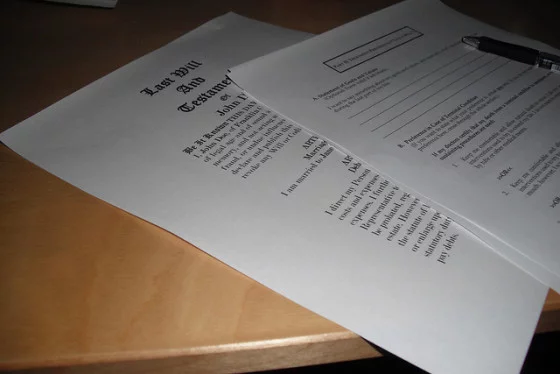Wills And Estates In California

What Is A Will?
You’ve probably seen a movie that involves a dramatic reading of a “last will and testament” (and it probably started a squabble among the family members). Your “will” is a legal document in which you determine what will happen to your assets after you die. You have a lot of options for what goes into your will, including:
- giving property to specific people (“beneficiaries”)
- naming someone to manage your estate for the benefit of minor children
- naming a guardian for your minor children
- donating property to a charitable organization
- designating an executor to ensure that your will is carried out
Essentially, your will acts as a road map for your “estate” – the assets you leave behind. Your executor will be in charge of making sure that your will is followed and for dealing with any problems or unforeseen circumstances that arise in the management of your estate, such as claims by creditors or disputes among family members.
What Can A Will Do?
First and foremost, a will is a way to make sure that your estate is handled the way you want it to be. You can leave money and property to whomever you choose and you can make arrangements for the care of your children, spouse, and other loved ones. You can ensure that the estate covers your funeral expenses or that the money is saved for your grandchildren’s college tuition. Your will is your chance to decide what happens to your property.
However, there are certain legal requirements that may override what you’ve put in your will. For example, your estate may be required to pay back your debts before distributing anything to the beneficiaries. If the estate is large enough to cover those debts, the remaining assets will be distributed according to your will. If not, the whole estate will go to your creditors. In many states, any remaining debt will simply disappear. However, California is a “community property” state, meaning that your spouse is responsible for any debts incurred after you got married.
California law may also affect how your spouse and children are treated after your death. Because California is a “community property” state, your spouse is entitled to half of anything you earn or buy after you get married – regardless of what you put in your will. You may also be required to leave part of your estate to your ex-spouse. If you intend to disinherit your spouse, you’ll need to clearly state that in your will. You’ll also have to show either that you provided for your spouse in some other way outside of the will, that a prenuptial agreement or divorce settlement changes what your spouse is entitled to, or that your spouse has consented to being disinherited. Cal. Prob. Code §§21610, 21611. Similar restrictions apply to disinheriting your children. Cal. Prob. Code §§21620, 21621. If you want to disinherit your spouse or children in your will, you’ll need to work with an experienced attorney to determine what your options are and how best to achieve your goals.
What If I Don’t Have A Will?
If you don’t have a will, California’s “intestacy” laws will determine what happens to your estate. Generally, your spouse and children will receive the proceeds from your estate by default. If you have no spouse or children, the law will move on to your next closest relatives – parents, grandchildren, your spouse’s family, etc. The court will appoint someone to act as the executor of your estate and they’ll manage the payment of any debts and the distribution of any assets to your family members. If you have no family members by blood or marriage and no will, the state will claim your estate.
Managing Wills And Estates
When you think of estate planning, a will is probably the first thing to come to mind. It’s an important tool in your estate planning arsenal and a way to make sure that your family and loved ones are cared for. Some wills and estates are simple and a few forms are enough to manage them, but others are more complicated and require the help of an experienced California estate planning attorney. And remember – wills and estates aren’t just for retirees. Anyone can set up a simple will to direct the management of their estate in case of death, and it’s especially important if you have children or other dependents – you’ll have to choose a guardian and set up financial planning for them.
It can be uncomfortable to plan out what’s going to happen to your property after you’re gone, but thinking about it in advance and creating a will can save your family a lot of time and trouble trying to figure out what you may have wanted.
Image Credit and License
Are you in search for a certified attorney to represent you?
Let us help you find one today!

